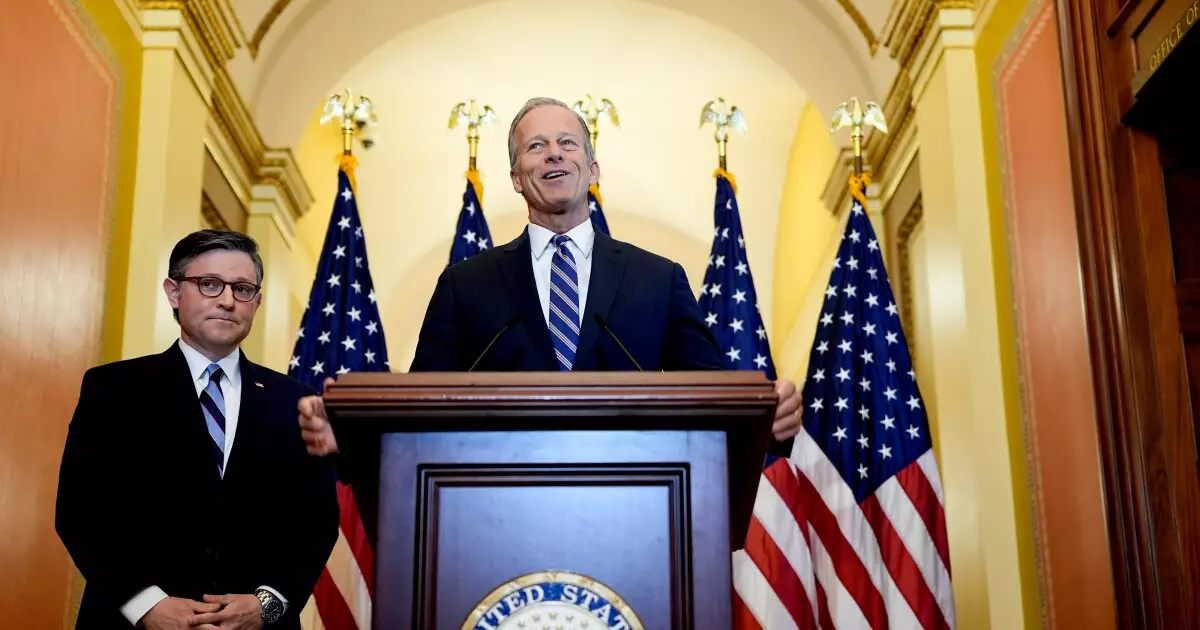The recent narrow passage of President Donald Trump’s “big beautiful bill” through the House of Representatives is a quintessential example of political theatre veiled as progress. On a razor-thin margin of 216-214, the Republican leadership managed to cajole a few hesitant members into supporting legislation that many believe falls short of genuine fiscal responsibility. While the rhetoric oozes optimism—promising $5 trillion in tax cuts and $1.5 trillion in spending reductions—the reality is muddied and far more complex.
The unwavering push from House Speaker Mike Johnson, alongside other prominent Republican figures such as Speaker Majority Leader John Thune, presents a façade of unity and purpose. However, beneath this carefully curated surface lies a cacophony of dissent and skepticism. The legislation’s passage indicates the necessity for the GOP to consolidate power rapidly, but it also signals a disturbing trend: one that prioritizes immediate political gains over sustainable fiscal stewardship.
The Chilling Implications for Municipal Bonds
At the heart of this debate lies a significant concern for municipal market participants: the potential targeting of the municipal bond tax exemption as lawmakers scramble to score revenue and implement cuts. The very notion that spending cuts might necessitate dismantling tax exemptions creates an unsettling atmosphere for local governments and public projects. Municipal bonds play a pivotal role in funding essential infrastructure, and the loose talk around cuts could jeopardize these critical financial instruments’ integrity.
Proponents of the bill argue that aggressive cuts can make the government more efficient and leaner for the American people. Yet, one must question the underlying motivations behind such a desire for efficiency. Will such cuts genuinely translate to improved services for citizens, or will they instead serve to consolidate power in the hands of a select few? The answer might very well depend on whom you ask, but there are too many indicators suggesting that the common citizen could find themselves bearing the brunt of these fiscal decisions.
A Dangerous Game of Fiscal Roulette
The juxtaposition of the House and Senate plans for budget cuts further complicates this narrative. As the House aimed for $1.5 trillion in cuts over ten years, the Senate only tentatively proposed a meager $4 billion. Such disparity speaks to a concerning dislocation between intended goals and achievable reality, creating an environment of mistrust and potential conflict between the two chambers. It is a game of fiscal roulette, and taxpayers may end up losing.
Furthermore, Rep. Victoria Spartz’s poignant remarks illuminate a significant concern—the forthcoming surge in deficit expansion. By altering accounting rules ostensibly to mask deficit increases, lawmakers enter treacherous territory. This is where the illusion of fiscal responsibility crumbles, raising alarms about the long-term viability of the measures at hand. Conditioning the American people to accept burgeoning deficits could very well lead to future generations grappling with unsustainable debt levels.
Empty Promises and Tax Cuts: The Vicious Cycle
The bill’s advertised tax cuts, although they tantalize with the prospect of more take-home pay for Americans, do not consider the more sinister implication of unmet promises. As evidenced by past behaviors, tax cuts often lead to an increased reliance on deficit financing, sapping resources from essential public goods and services. Instead of creating a robust economic environment where businesses and individuals thrive, the ongoing cycle of tax cuts followed by inadequate revenue generation creates a state of perpetual economic uncertainty.
This aligns with the larger narrative that center-right liberalism often espouses—balancing personal freedoms with fiscal conservatism. However, when measures that purport to promote individual economic enhancements pave the way for deficit horrors, it calls into question the very foundation of such beliefs. We must ask ourselves whether these tax cuts genuinely enhance individual freedoms or if they shackle future generations with the weight of debt incurred today.
In a landscape marked by political gamesmanship and layered complexities, the impending implementation of Trump’s sweeping legislation raises critical interrogatives about the efficacy and societal responsibility of our leaders. The path ahead is fraught with contentious debates and dire consequences, casting a long shadow over America’s fiscal future. How does a country reclaim fiscal sanity amid the chaos of partisan maneuvering? It is a question that remains glaringly unanswered.

